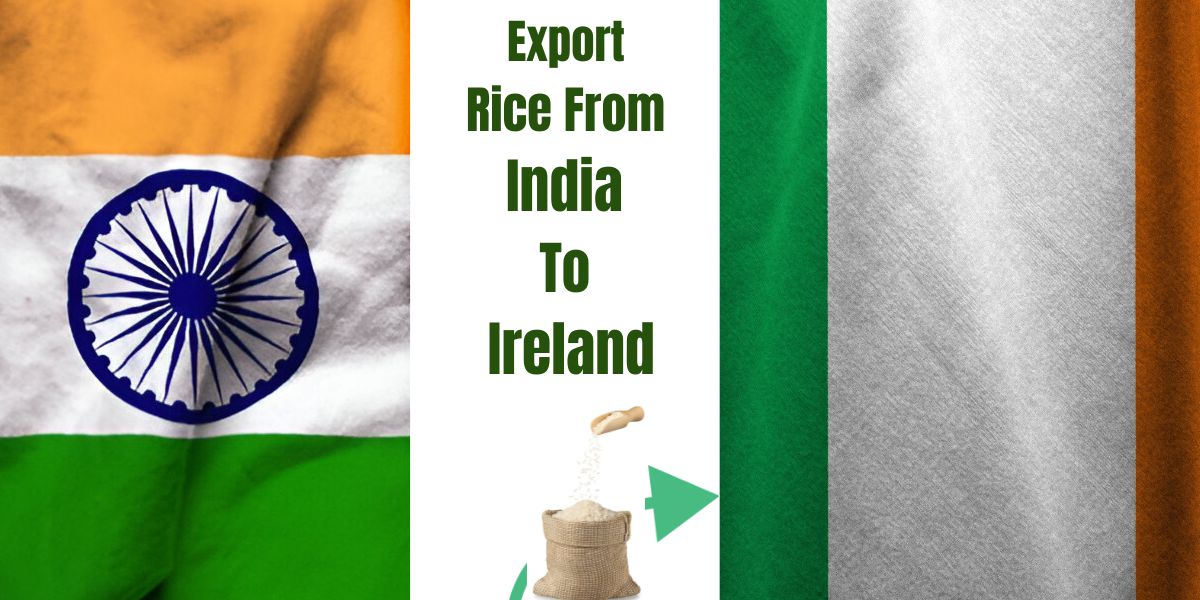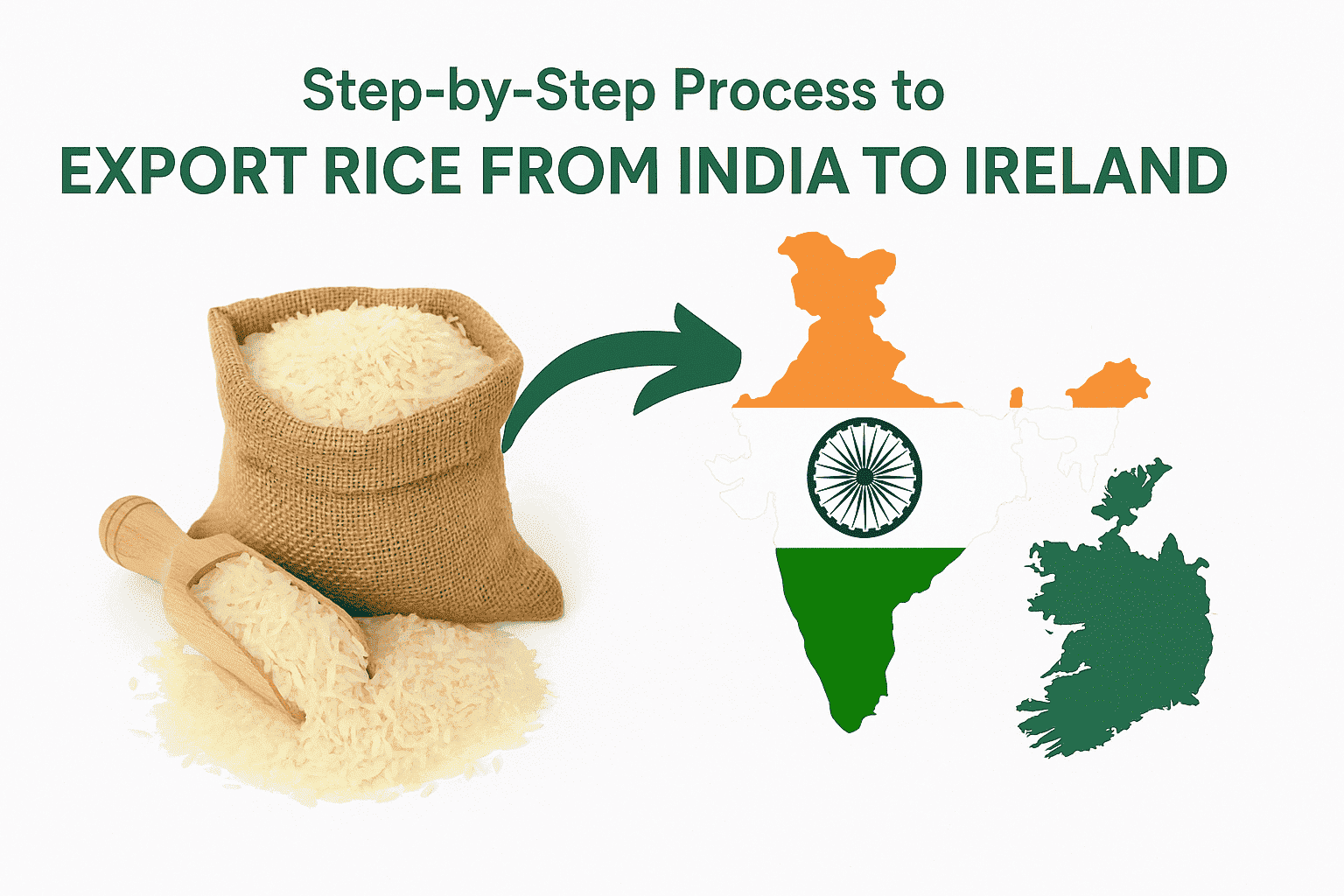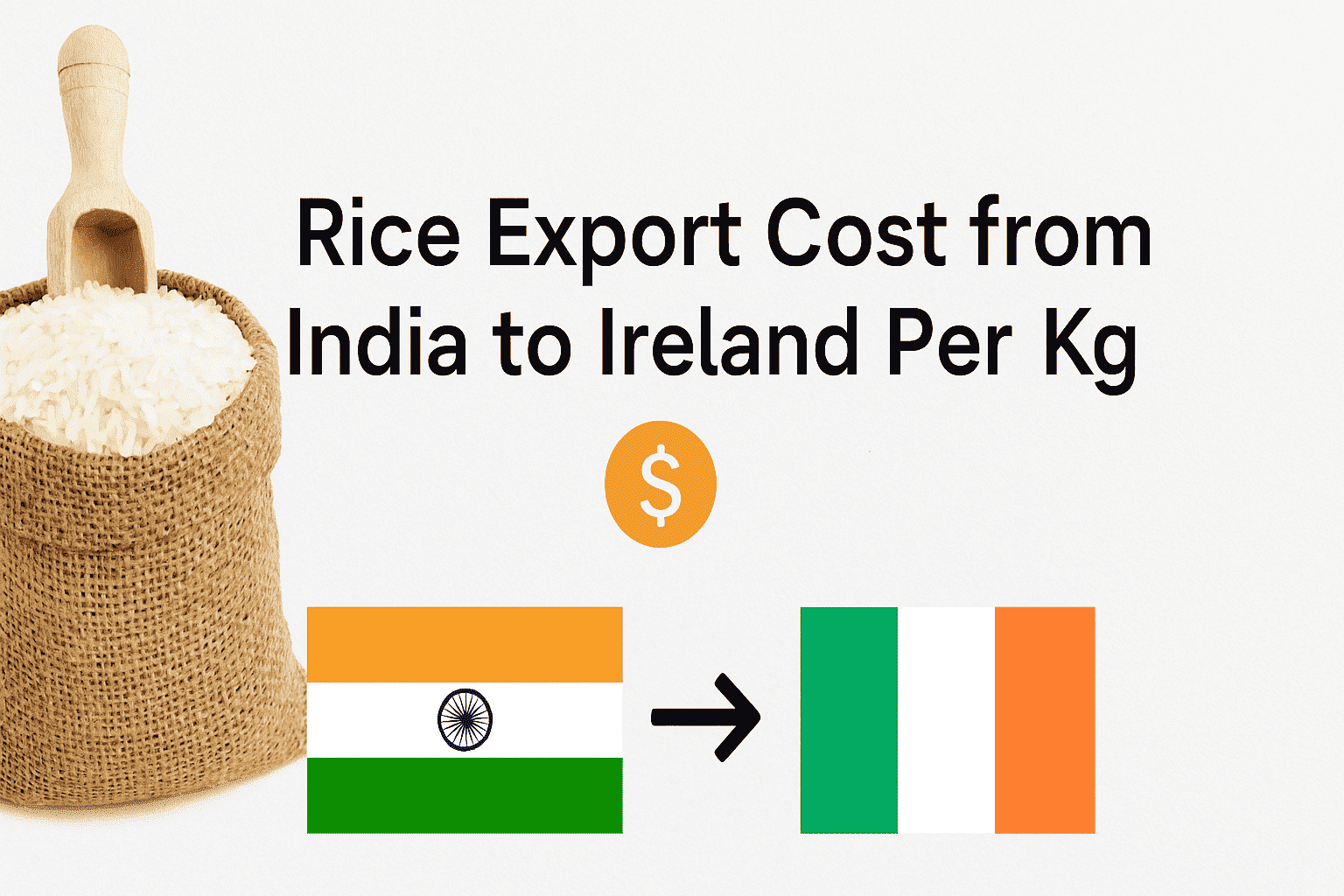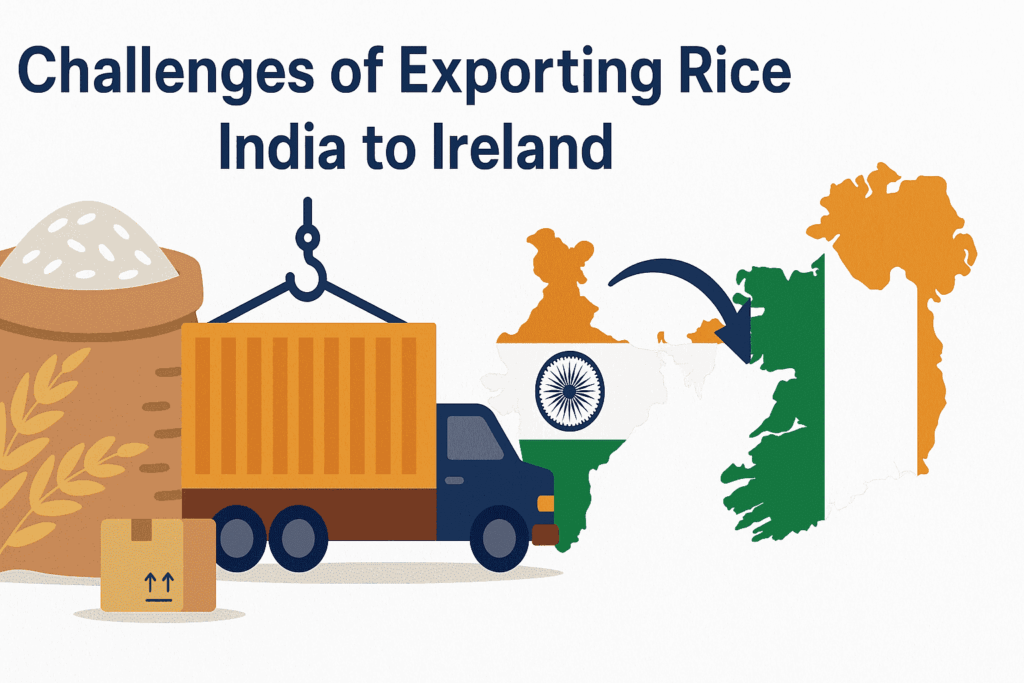


Rice from India is among the world’s leading exporters, supplying aromatic Basmati and nutritious Non-Basmati varieties to nations across the globe. In addition, Ireland is one such growing market, where demand for premium quality Indian rice is steadily increasing due to multicultural cuisine and health-conscious consumers.
If you’re planning to export rice from India to Ireland, understanding the legal procedures, logistics, and buyer preferences is crucial. Furthermore, we’ll walk you through every step of this detailed guide, including documents, rice varieties, cost structures, and marketing strategies you need to establish a successful rice export business.
Further, Ireland is an attractive destination for the export Rice from India to Ireland exporters:

Rice exports from India to Ireland are profitable due to a growing demand in Irish supermarkets and ethnic food stores. However, entering the Irish market requires proper planning, certifications, and market knowledge. Follow this step-by-step process to export rice from India to Ireland to ensure smooth and successful shipments.
To legally export rice from India to Ireland, the following registrations are essential:
Additionally, Irish and EU import standards must be met, including pesticide residue limits and food traceability norms.
Irish supermarkets and ethnic stores cater to a diverse market. Hence, exporters must select varieties that match buyer expectations:
| Rice Type | Demand in Ireland | Target Buyers |
|---|---|---|
| Basmati Rice | High (Premium Market) | Restaurants, Retail Stores |
| Non-Basmati Rice | Moderate (Affordable) | Supermarkets, Wholesalers |
| Organic/Brown Rice | Growing (Health Market) | Health-Conscious Consumers, Niche Stores |
There are several ways to identify potential buyers in Ireland:
To ensure compliance with EU food laws, your rice must be packaged appropriately:
To ensure compliance with EU food laws, your rice must be packaged appropriately:
Choosing the right shipping mode is essential for timely delivery and cost management:
| Shipping Method | Transit Time | Cost Efficiency | Best For |
|---|---|---|---|
| Sea Freight (via Mumbai to Dublin Port) |
25–35 days | Cost-effective | Large shipments |
| Air Freight (Direct to Dublin) |
3–7 days | Expensive | Urgent or sample consignments |

The rice export cost from India to Ireland per kg depends on grain type, quality, and global freight rates. Below is an estimated price range:
| S.No | Rice Variety | Grain Length | Type | Price (INR/Kg) | Price (USD/Kg) |
|---|---|---|---|---|---|
| 1 | 100% Broken Parboiled Rice | 4.80 mm | Non-Basmati | ₹38.50 | $0.46 |
| 2 | 100% Broken Raw Rice | 4.75 mm | Non-Basmati | ₹37.00 | $0.45 |
| 3 | 1121 Creamy Sella Basmati Rice | 8.25 mm | Basmati | ₹74.50 | $0.90 |
| 4 | 1121 Golden Sella Basmati Rice | 8.30 mm | Basmati | ₹79.50 | $0.96 |
| 5 | 1121 Steam Basmati Rice | 8.35 mm | Basmati | ₹82.00 | $0.99 |
| 6 | 1401 Raw Basmati Rice | 7.60 mm | Basmati | ₹99.50 | $1.20 |
| 7 | 1401 Steam Basmati Rice | 7.65 mm | Basmati | ₹97.00 | $1.17 |
| 8 | 1509 Creamy Sella Basmati Rice | 8.10 mm | Basmati | ₹64.00 | $0.77 |
| 9 | 1509 Golden Sella Basmati Rice | 8.15 mm | Basmati | ₹67.50 | $0.81 |
| 10 | 1509 Steam Basmati Rice | 8.20 mm | Basmati | ₹69.00 | $0.83 |
| 11 | IR 64 Parboiled Rice | 6.30 mm | Non-Basmati | ₹47.00 | $0.57 |
| 12 | IR 64 Raw Rice | 6.20 mm | Non-Basmati | ₹45.00 | $0.54 |
| 13 | PR 11/14 Creamy Sella Basmati Rice | 6.70 mm | Non-Basmati | ₹48.00 | $0.58 |
| 14 | PR 11/14 Golden Sella Basmati Rice | 6.75 mm | Non-Basmati | ₹49.50 | $0.60 |
| 15 | PR 11/14 Steam Rice | 6.80 mm | Non-Basmati | ₹48.50 | $0.58 |
| 16 | Pusa Creamy Sella Basmati Rice | 7.90 mm | Basmati | ₹90.00 | $1.08 |
| 17 | Sarbati Creamy Sella Basmati Rice | 7.50 mm | Basmati | ₹82.00 | $0.99 |
| 18 | Sarbati Golden Sella Basmati Rice | 7.55 mm | Basmati | ₹84.00 | $1.01 |
| 19 | Sarbati Steam Basmati Rice | 7.60 mm | Basmati | ₹86.00 | $1.04 |
| 20 | Sona Masoori Parboiled Rice | 5.50 mm | Non-Basmati | ₹54.50 | $0.66 |
| 21 | Sona Masoori Raw Rice | 5.40 mm | Non-Basmati | ₹52.00 | $0.63 |
| 22 | Sona Masoori Steam Rice | 5.45 mm | Non-Basmati | ₹53.50 | $0.64 |
| 23 | Sugandha Creamy Sella Basmati Rice | 7.80 mm | Basmati | ₹88.00 | $1.06 |
| 24 | Sugandha Golden Sella Basmati Rice | 7.85 mm | Basmati | ₹89.50 | $1.08 |
| 25 | Sugandha Steam Basmati Rice | 7.90 mm | Basmati | ₹91.50 | $1.10 |
| 26 | Swarna Parboiled Rice | 5.30 mm | Non-Basmati | ₹46.00 | $0.55 |
| 27 | Swarna Raw Rice | 5.20 mm | Non-Basmati | ₹44.50 | $0.54 |
| 28 | Traditional Creamy Sella Basmati Rice | 7.70 mm | Basmati | ₹95.00 | $1.14 |
| 29 | Traditional Raw Basmati Rice | 7.50 mm | Basmati | ₹105.00 | $1.27 |
*Please note that the prices are approximate and may vary based on packaging, volume, and port destination.

Further, to stand out in the Irish rice market, you need to conduct targeted promotions:
Exporting rice from India to Ireland now is an excellent opportunity to tap into this high-potential market. In addition, with proper licenses, competitive pricing, and effective logistics, you can build a sustainable export business.
Additionally, at Shah Enterprises, we offer premium Basmati and Non-Basmati rice varieties that meet international standards. As a result, you can grow in the Irish market, whether you’re a new exporter or a seasoned trader. Our support services range from sourcing to packaging and shipping so that you can get the most out of the Irish market.
Ireland imports rice mainly from countries like India, Pakistan, Thailand, and Vietnam—depending on the type, such as Basmati or Jasmine.
To export rice to Europe, register with DGFT, get an IEC code, follow EU food safety norms, and choose a reliable freight partner. Shah Enterprises can guide you through the full process.
You can find international buyers through trade portals, food expos, B2B websites like Alibaba or Indiamart, and via export consultants like Shah Enterprises.
Yes, rice is commonly available in Ireland, especially in supermarkets and Asian stores. Basmati, Jasmine, and short-grain varieties are widely used.
Yes, rice is part of the Irish diet—especially in dishes like curries, stir-fries, and healthy rice bowls.
Register your company with DGFT, get an Import Export Code (IEC), and apply for FSSAI and APEDA certifications to export rice legally from India.
The Minimum Export Price (MEP) is set by the Indian government and may vary. As of now, it ranges between $300–$600 per metric ton, depending on the rice variety.